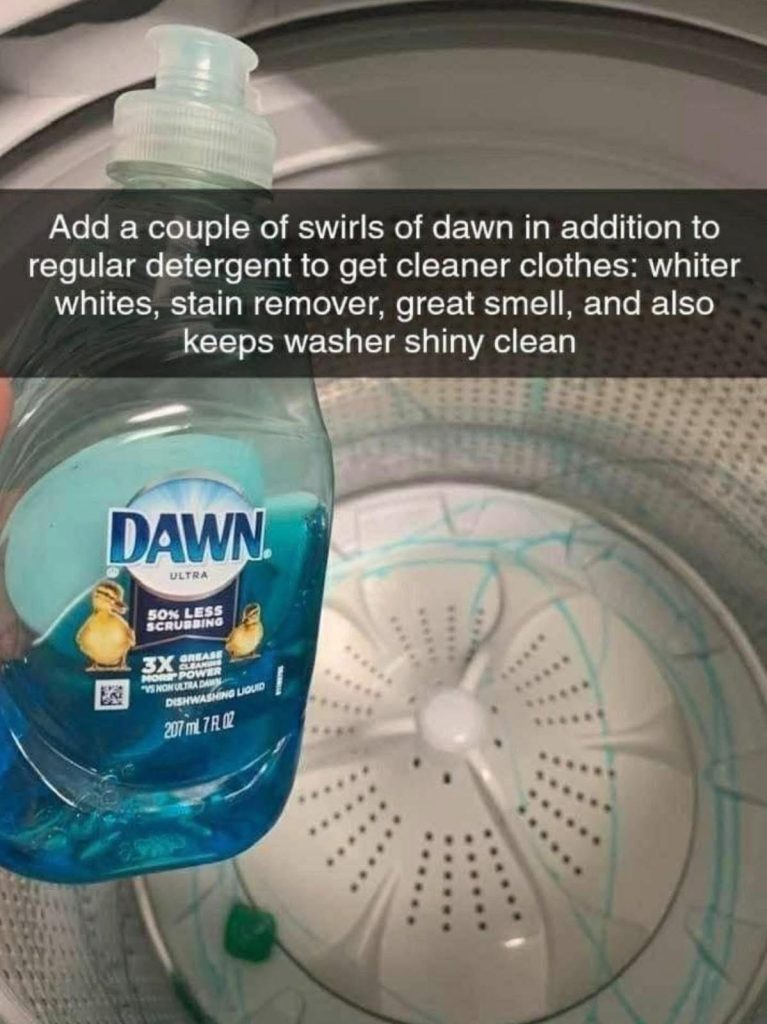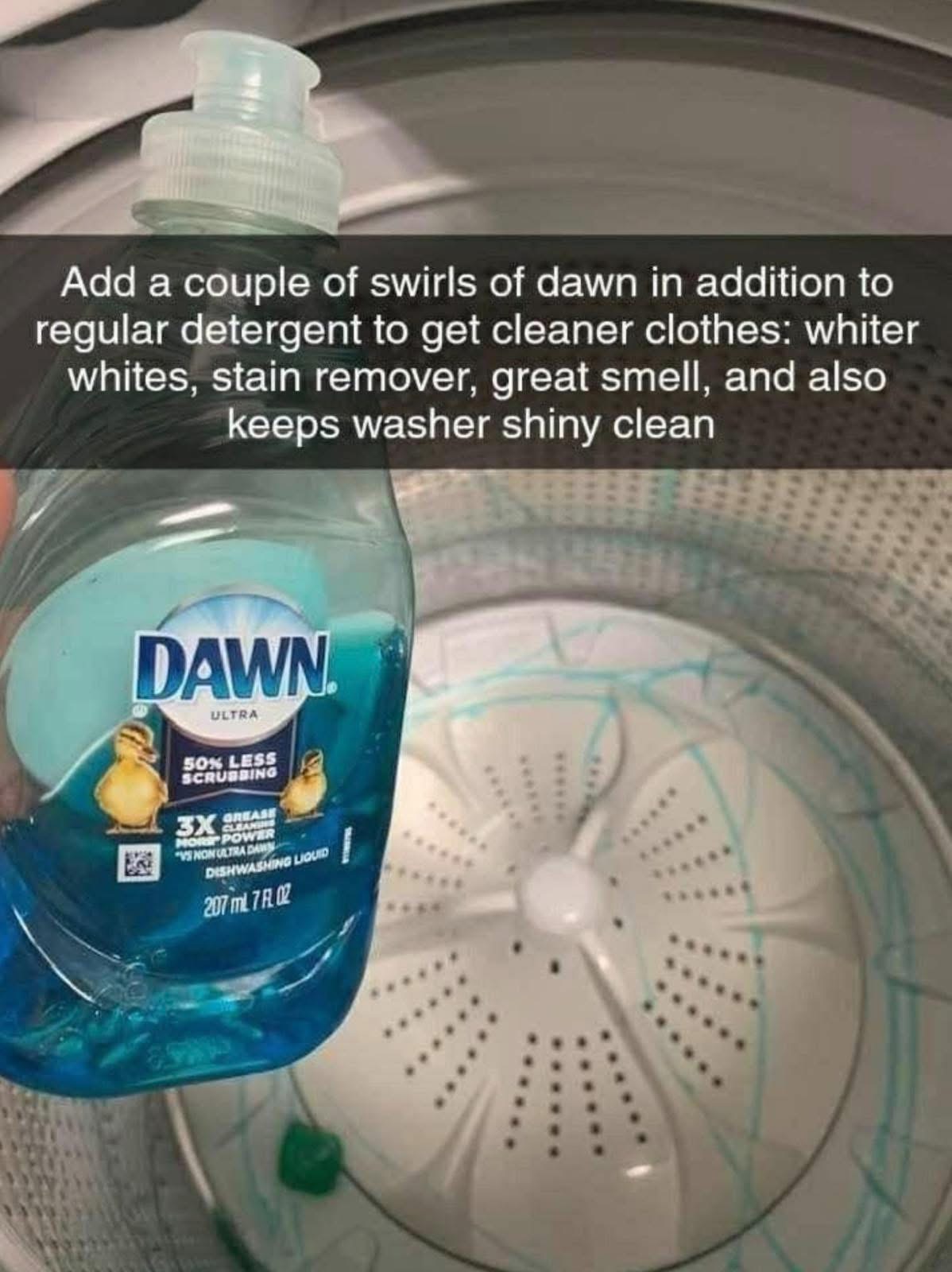
🧼 Can You Use Dawn Dish Soap in a Washing Machine? A Complete Guide
The image you shared suggests adding a couple of swirls of Dawn dishwashing liquid to your regular laundry detergent to achieve cleaner clothes, whiter whites, effective stain removal, and even a cleaner washing machine. While this tip is popular on social media, it’s crucial to deeply understand the science, safety, benefits, risks, and best practices behind it before trying it at home.
Let’s explore this topic thoroughly.
📌 What the Tip Claims:
- Whiter Whites
- Better Stain Removal
- Great Smell
- Keeps Washer Shiny Clean
✅ Potential Benefits of Adding Dawn Dish Soap to Laundry
1.
Superior Grease Cutting Power
Dawn is formulated to cut through tough grease and oil, which is why it’s famously used to clean animals after oil spills. This property can help remove oily stains from clothing better than some laundry detergents alone.
2.
Stain-Fighting Abilities
Dawn can be very effective against:
- Food grease stains
- Oil-based makeup
- Sweat and body oil stains
3.
Cost-Effective Spot Treatment
Using a small amount of Dawn directly on stains is a budget-friendly stain remover compared to specialized laundry products.
4.
Fresh, Clean Smell
Dawn has a pleasant scent that may lightly freshen laundry when used in very small quantities.
5.
Washing Machine Maintenance
The degreasing power of Dawn can help prevent residue build-up in your washing machine if used correctly, potentially extending the life of the appliance.
⚠️ Serious Risks and Warnings
While this hack has some merit, misuse can lead to serious problems.
1.
Excessive Suds
Dish soap is a high-sudsing agent. Washing machines (especially HE, or High Efficiency, models) are designed for low-sudsing detergents.
- Too much dish soap can flood your machine with suds, leading to leaks, machine damage, or sensor malfunctions.
- Over-sudsing can void warranties.
2.
Residue Build-Up
Ironically, if not fully rinsed, dish soap can leave soap scum or sticky residues on your clothes and inside your machine, especially in cold washes.
3.
Potential Damage to HE Washers
High-efficiency washers are particularly sensitive to sudsing. Dish soap can:
- Trigger suds error codes.
- Cause machine overflows.
- Leave behind residue in the pump system which can result in clogs or premature machine failure.
4.
Skin Irritation Risks
Dish soaps are not dermatologically tested for use in clothing fabrics.
- Leftover residues can cause skin irritation, rashes, or allergic reactions, especially for those with sensitive skin.
✅ How to Use Dawn Dish Soap Safely in Laundry (If You Choose To)
If you want to try this method, extreme caution is necessary. Here’s how to do it properly:
🔹 Step 1: Use the Tiniest Amount
- Use NO MORE than 1 teaspoon (5 ml) of Dawn per regular load.
- For HE machines, use less than half a teaspoon.
🔹 Step 2: Dilute First
- Mix the Dawn with warm water and pour it into the drum before adding clothes.
- Do not pour dish soap directly on clothes.
🔹 Step 3: Combine with Regular Detergent
- Always use your normal laundry detergent. Dawn should only be a supplement.
🔹 Step 4: Run Extra Rinse Cycle
- To ensure no dish soap remains on your clothes, add an extra rinse.
🔹 Step 5: Avoid HE Washers If Possible
- This method is generally safer in non-HE, older top-loading machines.
🧑🔬 Expert Opinions
Laundry Experts Say:
- Consumer Reports strongly advises against using dish soap in washing machines.
- Manufacturers like Whirlpool, LG, and Samsung caution that dish soap is not designed for washing machines and may void warranties.
Professional Cleaners Recommend:
- Dawn is excellent as a pre-treatment stain remover but should not be added directly to the wash cycle.
✅ Safer Alternatives to This Hack
If you want the benefits without the risk:
- Pre-treat stains with diluted Dawn directly on fabric, then wash as usual.
- Use laundry detergents with built-in degreasers like Persil ProClean or Tide Ultra Stain Release.
- Add white vinegar (1/2 cup) to the rinse cycle to naturally freshen, soften, and help break down residue.
- Use washing machine cleaners like Affresh to keep your machine shiny and clean.
✅ Best Practices for Stain Removal Using Dish Soap
- Mix 1 part Dawn, 2 parts hydrogen peroxide for a powerful pre-wash stain remover. This works particularly well on grease, sweat, and yellowing.
- Gently rub the mixture into the stain and let sit for 5-10 minutes before washing.
- Always patch test colored fabrics.
✅ Summary Table: Pros & Cons of Using Dawn in Laundry
| Aspect | Pros | Cons |
| Cleaning Power | Excellent grease remover | Excessive suds |
| Stain Removal | Great for oily stains | Possible residue build-up |
| Machine Safety | May clean the drum | Can damage HE washers |
| Skin Safety | Generally safe in rinse-out cycles | Potential for irritation |
| Cost | Cheap stain remover | Costly repairs if misused |
🚨 Final Verdict
| ✅ Safe Uses | 🚫 Unsafe Practices |
| Pre-treating stains | Using large amounts of Dawn in the washer |
| Tiny amounts in top-load washers | Using any amount in HE washers |
| Diluted in warm water before adding | Pouring directly on clothes or adding to detergent drawer |
Summary:
👉 Is it safe to add Dawn dish soap to laundry? Only in extremely small amounts and preferably in older, non-HE machines. The safer and more recommended method is to use Dawn as a pre-treatment rather than mixing it into your wash.
If you love this hack for stain-fighting, I recommend you pre-treat stains with Dawn but stick to laundry detergents during the wash cycle.
